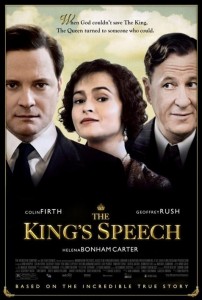“The Kings Speech” Offers Lessons on Stuttering, Disabilities
Review by David Shrank, MSW
“Just take your time.”
This is an infamous line that I and many other people who stutter frequently hear. It was also used near the beginning of the Oscar-winning film “The King’s Speech,” which is now available on DVD and Blu Ray.
I say it is infamous because non-stutterers think they are giving stutterers helpful advice when they say it. That couldn’t be further from the truth. When you say this you can make stutterers feel more self-conscious and judged.
Still, as a social worker and stutterer I recommend you watch the “The King’s Speech,” which originally played in theaters in 2010.
The film can give social workers an idea of the challenges stutterers face when they try to make their voices heard. And it offers insights on how to help clients who are dealing with speech issues, such as those who have had a stroke or brain injury.
“The Kings Speech” follows King George VI (actor Colin Firth) as he worked to overcome his stuttering with the help of Australian speech therapist Lionel Logue, who is portrayed by actor Geoffrey Rush.
Public speaking is an important task for British royals but was even more crucial during the reign of King George VI, who had to encourage his subjects through the dark days of World War II.
“Get it out.” “Just take your time.” “Form your words carefully.” “Relax.” “Just try it.” “DO IT!”
These are the words of George VI’s father King George V (actor Michael Gambon) said in the movie as his son was getting ready for a speech. His father’s mood went from calm to frustrated, angry and irate.
This can only lead to self-doubt, poor self esteem, panic, anxiety, fear, and tension on the part of the stutterer, making it even more difficult for them to communicate.
“The King’s Speech” identified many other issues a person who stutters has when communicating with others:
- King George VI stuttered less when speaking to his wife and children. This is common among stutterers, who tend to be more relaxed among loved ones. And his wife Queen Elizabeth (played by Helena Bonham Carter) was one of his biggest advocates. However, King George VI was tenser and stuttered more around his brother Edward, who bullied him as a child and adult.
- Reading out loud to a group is difficult for stutterers. However, stutterers often have no problem reading in public when they do it along with a group of people or there is background noise.
- Logue in the film effectively pointed out how the principles of singing can be applied to treating stuttering. A good speech therapist will put a lot of time in teaching what sounds to hold and not hold when speaking, which relates well to singing.
- Another technique Logue used was to get King George VI to shake his jaw and different parts of his body to relax before public speaking. He also showed that exercise is an effective relaxation tool.
- It was interesting to see Logue use cursing as a way to promote fluency. This is a concept that is rarely discussed but is usually effective. People who stutter usually don’t stutter when they curse. Cursing is usually related to anger. Anger promotes empowerment and self-confidence and is a good way to decrease tension.
- Logue pointed out the importance of memorizing or being very familiar with a speech before you deliver it. This technique, which can be effective for stutterers and non-stutterers, is important in public speaking because it allows a person to focus on how something is said instead of what is being said.
I did have a few qualms with the film. In one scene Logue said stuttering can be cured. That is false — there is no cure for stuttering but fluency can be dramatically improved provided stutterers get proper support.
I also did not like that a doctor in the film said stuttering is caused by “mechanical difficulties in speech.” That is a demeaning way to describe stuttering, which has many physiological and psychological components that can be difficult to treat.
Still, I love the “The Kings Speech” because King George VI’s journey reflects what I and a lot of stutterers have experienced. Like him I was bullied and had low self-esteem. However, I also have a very supportive wife as he did.
Just as the King had a strong voice, all people who are blessed to have a disability such as stuttering have a voice and it’s equally as powerful as any other voice.
Shrank is founder and CEO of Empowerment Behavioral Therapeutic Services. He has been a corrections case manager in Trenton, N.J. where he monitored former inmates who had persistent mental illness. He also provided them with clinical therapy, resources, and acts as their court liaison. Shrank was also head of mental health and a board member for the Equality Project, an anti-bullying activist nonprofit agency. Shrank received his master’s degree in social work from Temple University.
To learn more about how Shrank and other social workers help people with mental illnesses and disabilities visit the National Association of Social Workers “Help Starts Here” consumer Website by clicking here.
| Leave A CommentAdvertisement
1 Comment
Trackbacks
Leave a Comment
You must be logged in to post a comment.





